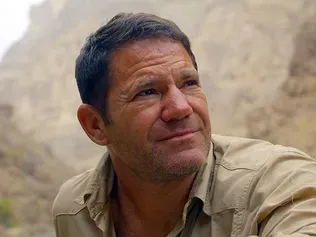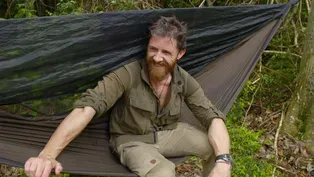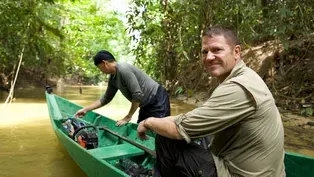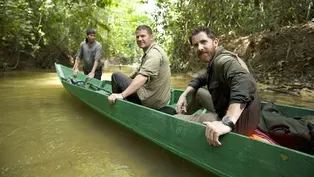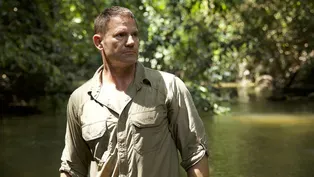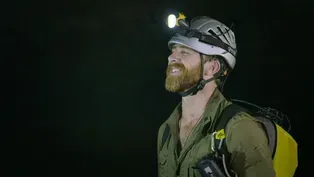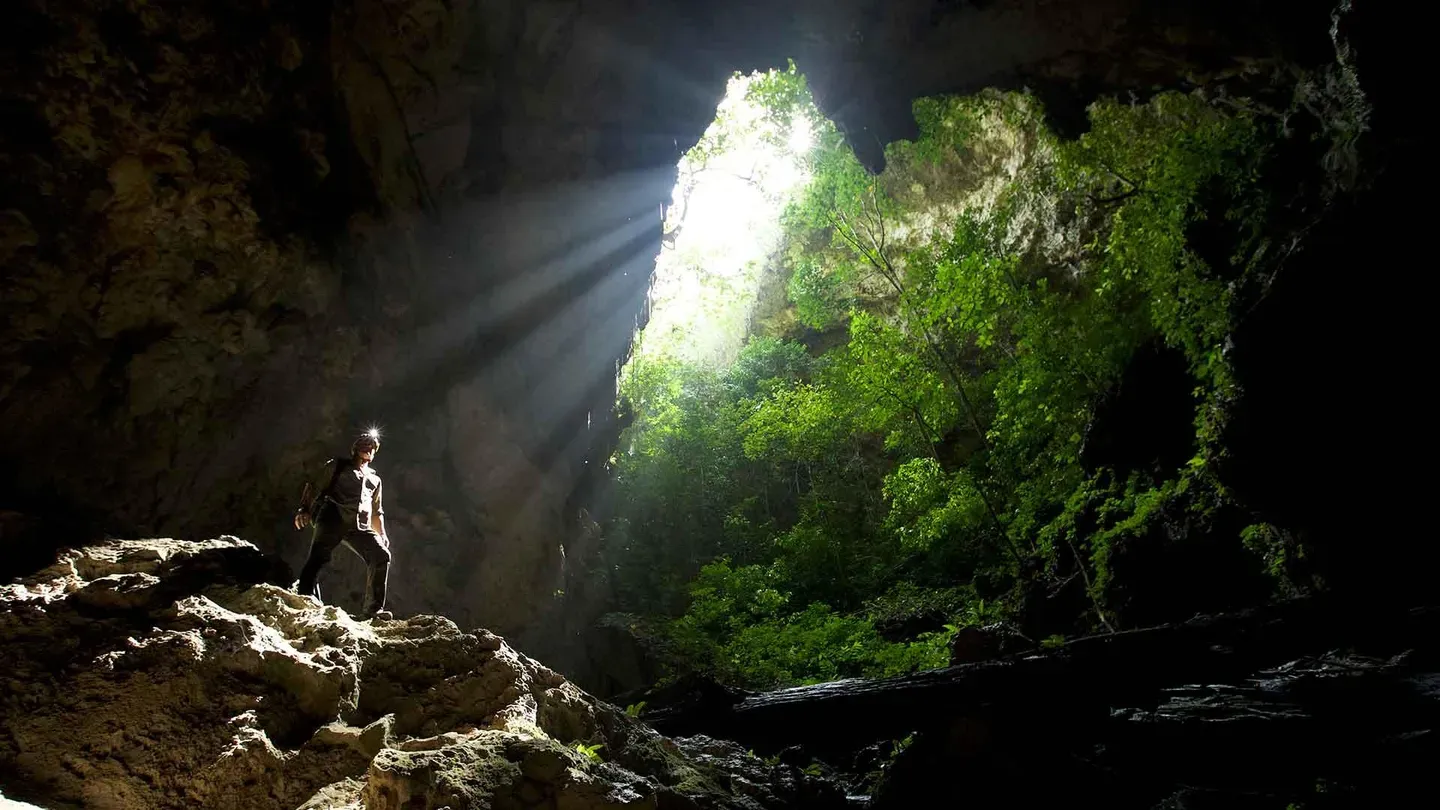

Borneo – Dark Shadow
Season 1 Episode 5 | 48mVideo has Closed Captions
Follow Steve Backshall into a Bornean cave system.
Follow Steve Backshall as he drops down a sinkhole to explore a series of underground Bornean caves threatened by deforestation and limestone quarrying. The journey may lead to the potential to explore other undiscovered subterranean worlds.
Problems with Closed Captions? Closed Captioning Feedback
Problems with Closed Captions? Closed Captioning Feedback

Borneo – Dark Shadow
Season 1 Episode 5 | 48mVideo has Closed Captions
Follow Steve Backshall as he drops down a sinkhole to explore a series of underground Bornean caves threatened by deforestation and limestone quarrying. The journey may lead to the potential to explore other undiscovered subterranean worlds.
Problems with Closed Captions? Closed Captioning Feedback
How to Watch Expedition
Expedition is available to stream on pbs.org and the free PBS App, available on iPhone, Apple TV, Android TV, Android smartphones, Amazon Fire TV, Amazon Fire Tablet, Roku, Samsung Smart TV, and Vizio.
Buy Now

Meet Steve Backshall
Steve Backshall takes PBS behind his adventures, explains how the expeditions are chosen, and explores our role in protecting these magnificent locations.Providing Support for PBS.org
Learn Moreabout PBS online sponsorship[rooster crows] I'm Steve Backshall and I've come to Borneo a place I know and love.
My life of adventure started here nearly 30 years ago.
Back then, it seemed like a paradise.
But things have changed.
We're beginning in a tiny frontier town.
It's got a real kind of feeling of the Wild West about it.
It's taken us five days of travelling just to get here from the UK and we're only just getting started.
We have two days' worth of boat travel from here, heading up towards one of the most special parts of the whole of Borneo.
There may be discoveries in these mountains just waiting to be revealed.
I've never seen anything like that before in my entire life.
How does the world not know about this?
If we can find what we're looking for... -[Aldo] Shall we get this show on the road?
-[Steve] Let's do it.
..we could help protect the future of this amazing place.
[Steve] We're on steep and treacherous terrain leading up to a rockface.
But we'll be pushed to our limits.
Ahh, this is a disaster.
[Steve] Rock, rock, rock!!
Yahh!
There are parts of our planet that may be hiding ancient secrets.
Check that out!
That's our first glimpse of the limestone mountains we're heading into.
We're in the Indonesian part of Borneo.
Here, vast, jagged mountains burst out of dense, pristine forest.
Borneo's been a really special place to me for expeditions.
You know, my very first expeditions were here, nearly 30 years ago now, which makes me feel very old.
But, more than that, in these mountains are the memories of our ancestors.
We're going upriver to meet an Indonesian team of experts.
Less than a year ago, they discovered that ancient cave art in these mountains is amongst the oldest on the planet.
This could be one of the most significant places on Earth for the study of human history.
But it could also be the most challenging.
At the far end of this formidable mountain range, there are rumoured to be unmapped caves.
We want to be the first team to track them down and discover whether they're hiding priceless artefacts.
[Steve] Because of what's been found here and what that's led us to know to understand about our own history, there's a move to try and turn them into a UNESCO World Heritage Site.
A reserve to make it a protected place.
It's incredibly important because deforestation is coming in from all sides, so trying to find some degree of protection is incredibly important and it has to happen soon.
The loggers, chainsaws and trucks are poised to move in.
But if we can find new archaeological treasures here, we could help protect this re mote corner of Borneo forever.
Joining me is expedition trained medic Aldo Kane.
[Steve] I would say, from my perspective, that this limestone cast covered in rainforest is the hardest environment in the world.
Without doubt.
You've got all that limestone that's been pushed up and then washed away by the rain, so it's like sharp and covered in holes.
Ankle breakers.
And then, on top of that, you've got one of the hardest environments to walk around and navigate through is jungle.
The only thing worse than that is caves.
[both laugh] Our local team of guides and scientists are waiting for us deep in the forest.
[Steve speaks Bahasa] [Steve speaks Bahasa] -Ali.
-Ali.
Ali.
-Hendrick.
Yeah.
-Hendrick?
[man speaking Bahasa] [Steve] Check that out!
They're walking in football boots.
And not just football boots but plastic football boots.
[Steve speaking Bahasa] I'm asking if their feet don't get hot.
They're going, "No!
No!
They're fine."
[Steve speaks Bahasa] [all laughing] They're laughing at me.
They go, "You wear those and you are gonna die, white man."
[laughing] This encampment that's used by people who are heading up into the forests to collect birds' nests, which are used for bird nest soup.
The birds, the swiftlets, nest in the caves here and it's incredibly valuable.
Edible birds' nests are known as the caviar of the east, fetching as much as $10,000 a kilo.
The commercial drive for birds' nests has unexpectedly led to incredible scientific discoveries.
Dr Pindi Setiawan, one of the world's leading experts in rock art, has relied on these local collectors to guide him to the most remote parts of the forest.
Together, they discovered the oldest paintings created by man.
Really?
So it can be dangerous here?
-Er, in the past.
-Yeah.
Collecting birds' nests is perfectly legal.
But because it's so lucrative, it's a secretive and highly territorial industry.
We will be completely reliant on the hard-won knowledge of the only nest collector who operates this remotely - Pakhan.
I was just asking... Pakhan's one of the first people to explore the caves around here collecting birds' nests.
[Steve talks Bahasa] Yeah, so he has been coming here for many years collecting the birds' nests.
I think what we're learning more than anything is that the experience of the bird's nest collectors working here over years and years and generations is gonna be everything to getting us where we need to go.
So people, like Pakhan, who know everything are gonna be our ticket to something special.
[Aldo] These boat guys are amazing.
The rivers are getting much narrower and much shallower.
That's why they've got these long extensions on the props, so that they can go super-shallow.
Full steam ahead.
We're headed to a bird's nest cave at the source of this river.
For now, we're making good progress through the jungle.
But when the river runs out, life won't be so easy.
[Steve] Oh, wow, look at that!
A good-sized croc just hammered into the water.
Good three metres in length.
Really substantial animal.
I'm surprised to see them this far up the river.
Saltwater crocs are the world's largest reptile.
Despite their name, they also live in fresh water rivers like this.
A saltwater croc has the strongest bite in the animal kingdom and is the animal most likely to eat a human.
How does it feel wading around in this having seen that massive croc?
[Aldo] I know!
[laughs] Trying not to think about it.
[Aldo] Big trees now, aren't they, in the water?
Watch yourselves.
-[Steve] I'm standing way back.
-[Aldo] Yeah.
[chainsaw roaring] operating a chainsaw barefoot, waist deep in a crocodile-filled river.
[Steve] Whey!
These rivers are basically highways of the jungle.
It's much easier to use a river to get from A to B.
So we're gonna use this river as far as we can get today.
[Aldo] Ah, OK, spiky.
Yep, that's spiky.
Oh!
I'm now up to my waist in nasty mess.
It's gonna be a long day.
It does feel a bit, sort of, crocy in here.
Here?
Oh.
Big?
Oh.
All sizes.
That's fun.
We make food and we camp.
We clear trees from our path.
Not again.
[Aldo] Is it going?
Got some tools coming out.
And we fix the boats.
Then, do it all again.
[thunder rumbles] -We're gonna get wet.
-[Aldo] More wet.
[Steve] More wet.
Is that possible?
After days of hacking our way up river, we're exhausted and morale is low.
[Aldo] We've been in the water all day and the minute we get out the water and it's opened up a bit, it started raining and it's cold.
-Erggh!
-Flipping miserable.
[laughs] [Steve] This is pretty spectacular, look at this.
This is our first flavour of what it is we're heading into.
The river is flowing into a cave.
Isn't that amazing?
This cave is as far as the boats can take us.
From here on in, we're exploring on foot.
[Steve] So, that cave there, that's where this river begins.
Though Pindi visited this cave with the nest collectors long ago, it's never been fully explored or mapped.
Having been following this river for the last few days and seeing where it starts, where it's born, it's just too tempting to get in there and see where it goes.
Cut this corner and go up and over.
-You alright?
-Just hit a rock.
[Aldo] Oh, it's kinda spooky going out into this water, isn't it?
[Steve] Yeah.
So, classically in this kind of limestone cast, it's super, super-porous.
The water comes flooding down through it.
You can see where it's dripping through here until it hits a bedding plain, a much more solid layer of rock, and that's when you get a river like this flooding out.
Oh, I can feel wind.
Quite strong wind.
Which means that there's something big at the end of this passage here.
That's quite exciting.
[eerie music] Lots and lots of bats.
Look at them all!
With all the bats, it's snake paradise.
And these cave racers are absolute specialists.
They seem to be triggered by vibration, so as the bats' wings come past them they'll snap out to grab a hold of a bat and then they'll constrict it and swallow it whole.
Up here, we have probably the world's creepiest animal.
Generally speaking, I'm a massive fan of things that scuttle.
This is the exception to the rule.
It's called a scutigera.
It's not until they actually get moving that you get a sense of why this is one of the creepiest of all critters in the cave.
There it goes!
OK. -Right.
-The last message.
So, the ancient people painted this animal?
-This animal.
-On the cave walls?
-On the cave walls.
-Really?
I've never heard of any cave art that has an invertebrate.
-Yep.
-That must be totally unique?
Ancient humans would have been drawn here in search of water.
But the abundance of it now means we're unlikely to find any signs left by them.
Check that out!
It's like a giant natural showerhead!
-[Aldo] Fresh-filtered water.
-So you think that filtered down -through the rock, that's gonna be good to drink?
-Yep.
-No water pump needed.
-Nope.
That's as good as it gets.
That is sweet!
Brilliant!
I love it!
I'm gonna get one of these installed in my house.
What, a shower?
[both laugh] You missed the boat, that was like 100 years ago.
I think I can see light round the corner.
Natural light.
[Steve] Oh, Wow!
[Aldo] That is impressive, isn't it?
[Steve] Woah, look at that!
Oh, that is awesome!
That's like another world, isn't it?
It's a sink hole, isn't it?
The roof's fallen in.
[Aldo] And the jungle's creeped down into it.
Oh, that's utterly beautiful.
[Aldo] It's like an oasis of light and life.
[Steve] Right now, this cave is fairly silent.
But come dusk, it's gonna be alive with the sounds of swiftlets pouring in here to nest.
This is incredibly dramatic.
What we're hoping for is to get to a cave like this that's never been documented before.
And that is a really exciting thought.
-[yelling] -Oh, careful!
[Steve] Careful, careful!
Retracing our steps out of the cave to make camp for the night...
It's fine.
..cameraman Mark has slipped and fallen on the razor-sharp limestone.
[Aldo] Is it bad?
Are you in shock?
Alright, don't worry.
Good bit of a gash.
[Aldo] Just keep sitting up.
The rock has cut right down to the bone.
[Aldo] When you don't have blood like that, it's usually quite... it's obviously quite deep.
It's just open to infection.
Untreated an infected wound in the jungle can kill within 12 hours.
[Aldo] We're just gonna need to make sure we keep cleaning it every day, probably.
For the rest of the expedition Mark will need to be under Aldo's constant medical supervision.
[Steve] This specific environment, cast limestone covered in rainforest, is probably the most challenging environment to work in.
What happened to Mark is, I think, an indication of how bad it could get.
Once we get a couple of days up into the mountains, anything, a broken ankle, a broken hand, is gonna be so, so serious.
Something that could be relatively easy to sort in the modern world, here is gonna be a survival situation.
Our journey will continue with a hike through a narrow mountain pass.
The gateway to the other side of the Gergaji range, where Pindi first discovered the oldest figurative paintings on Earth.
But we want to push further, looking for caves that have never been explored for ancient art before.
[Aldo] Shall we get this show on the road?
-[Steve] Let's do it.
With Mark's injury patched up, we're ready to go.
From here on in, we're on foot.
Pakhan, that's up the front, said he thought it'd be about six hours today.
Er, and it's a hot one.
There's no clouds above us.
So, it's gonna be hard.
Already it's proving quite slippery under foot and we're only five minutes out from camp.
Quite a good place for you to get tagged by a snake, so always give it a bit of prang on the way over.
Today will test our agility, not just our endurance.
[Aldo] That hole there is usually covered over by dead fall leaf litter and you wouldn't necessarily see that.
So it can quite often be the case that you can end up down one of these holes.
At best, snapping an ankle.
At worst, you could end up in a cave system.
Dead.
That's a pretty one.
Striped keelback.
Only itty bitty.
Surprisingly pretty.
And it stuck into my fingers.
[cameraman] Is it venomous?
Mildly.
It's venom can kill a frog, but the most I'll get from this bite is a bit of pain and some swelling.
Super-quick!
[chuckles] We're pushing ourselves up towards the mountain ridge.
There are no direct routes through this tangled limestone cast.
It's impossible to travel in a straight line.
Getting to any unexplored caves could take us days.
Fortunately, our guide, Pakhan, has an almost superhuman sense of direction.
Distance is meaningless in rainforest like this.
So it's best not to pay too much attention to the GPS and to how far you've gone.
That way madness lies.
Think the most depressing thing about forest like this is you've got no sense of where you are.
I know that above us right now is a stunning geological formation but I might as well be in a green cave for all I can see of it.
I think the first time we'll get a sense of where we actually are is when we go over, when we crest the ridge line.
It's like a game of the hare and the tortoise with Pakhan.
Trying to stick with him is just about impossible.
Just doesn't stop.
Now we're going uphill.
Sweat is leaking out of every pore.
We haven't even started the steep stuff yet.
[sighs] But nest collectors have a strong incentive to endure this jungle.
[Steve speaking Bahasa] One cave, if it has the right kind of birds' nests, can yield about $2,000's worth of birds' nests in a month.
And in a nation where people hope to earn that in a year that is a lot of money.
It's not surprising that these caves are so valued and the nests are so valued.
But bird nest collecting isn't the biggest threat to this forest.
[Steve] Going through Borneo, this is one of the places that scares me the most for conservation in the whole world.
The rate of deforestation here is insane.
And most of the plantations that have been put in the place of the forest will be desert within a decade.
Alongside that, you look at the harm that caused by bird's nest collecting.
It's nothing.
You know, it's a drop in the ocean.
Pakhan's knowledge of the bird's nest caves hidden in this forest could even be the key to protecting it.
I see blue sky!
[Aldo] That couldn't have come any quicker!
-Nice work, buddy.
-Well done, mate.
[sighing] Wow, now that is a mountain pass.
In recent years, I've come to dread coming to high points in Borneo because you look out and where you are the forest is just an island and beyond it is deforestation.
And that's kind of what I was preparing myself for.
I thought I'd get up here and be disappointed, but...
I'm gobsmacked.
This area, the Marang Mountains in Sangkulirang, is about half the size of Belgian.
It's enormous.
It's amazing.
That way you can see all the way to the horizon and it's nothing but forest and it looks like good forest.
You know, this place here gives me faith there is hope for the future of Borneo.
[Aldo] Basically, we've come over the top of the ridge line and down and we're heading over here to another cave.
So on our right we've got a huge drop.
We're now five days from the nearest civilisation.
Ahh, thank you, Steve.
It's just over this ridge that Pindi made the most exciting discovery of his career.
Wow.
-So, Pindi, we go in this way?
-Yeah.
This is a secret tunnel.
A secret passage to our cave.
Fantastic.
Do we need a torch?
We need light?
We have been granted special permission to spend the night here... hundreds of metres above the forest floor.
Super-heavy smell of guano from the swiftlets.
These are the first ones we've seen.
I guess that's a good sign.
That proves people are not coming to these caves otherwise these would have been collected.
-[bird tweeting] -In fact there's a little chick inside there right now.
It's just bizarre to think that these innocuous-looking little cups, made out of bird spit, has driven the exploration of these mountains.
The amount of effort it's taken us to get here.
And prospectors come in looking for that.
Just blows my mind.
And this trade has also led Pindi to make the discovery that has rewritten the history books.
Oh, my God!
40,000 years?
-40,000 years.
-40,000 years ago?
Oh, my God!
Pindi, it's incredible.
I've never seen anything like that before in my entire life.
They've made a... a kind of spiral of hands.
I don't know what I was expecting, but... it's so much more, it's so much more dramatic.
It could have been put there last week.
It's, it's so fresh, so clear.
It's emotional.
They, kind of, I...
I really feel something very, very powerful standing here.
Yeah.
You must be very, very proud every time you come here.
-Thank you.
-Thank you.
Thank you so much.
Last year, using special dating techniques, Pindi discovered that the paintings here are the oldest made by man.
[Steve] Have you counted them in here?
There is only... [laughs] "Only"!
Only 200.
Only 200 handprints.
-220.
-220.
[Steve] Every single bit of it's painted.
So the pigment here, how did they make the colour?
This is from a material called hematite.
Cave artists gathered rocks containing this iron-rich mineral.
They then heated and ground it up to make a vibrant red pigment durable enough to last over 40,000 years.
These hands have drawing inside them.
So these one almost look like fingerprints?
Pindi has dedicated his life to studying these symbols and their meaning.
I don't know where to look, there's so much going on.
There's another one there!
He's tirelessly pushed the boundaries of discovery to decode these ancient stories from the past.
So, what is this?
Ah, yeah.
I see!
So we're looking at the oldest example of creativity that's known on Earth.
This painting has completely reshaped our thinking about the origins of human culture.
It's provided Pindi with the evidence needed to secure special recognition for this site.
And that's a valuable step towards securing World Heritage protection for the whole area.
[Steve] Got quite used to camping out under the stars.
This is certainly the first time in my life I've ever taken a bed under prehistoric handprints.
I'm up early and my minds racing.
Yeah, it's crazy.
I genuinely wasn't expecting to be as moved by this place as I have been.
This is somewhere where you can feel history.
It feels like we're connected all the way back through time.
It's the only time in my life I've ever really felt that.
As important as this cave would have been to our ancestors, it's even more important now to our understanding of human life and how humans moved across the planet.
When these paintings were created, the world was in the middle of last ice age.
There was so much sea tied up in ice that the sea levels were 120 metres lower.
Borneo wasn't even an island.
Going back even further, Homo sapiens could come all the way from the cradle of life in Africa across Asia and down here to Borneo without ever having to cross the sea.
But we had no idea of the timeline until caves like this were starting to be studied.
I now realise our mission is more important than ever.
This is as far as Pindi has explored.
If we can find new cave painting sites, this could help secure and extend UNESCO World Heritage protection for the whole region.
It's vital to preserve these priceless works of art and the forest that surrounds them.
[Steve] So, Pindi, what's the plan today?
Let's hope we find something great today.
Oh, yeah!
We have a punishing hike ahead of us.
Some of the team will stay behind.
Only the core expedition members will push on.
We'll climb down from Jeriji Saleh into the cast maze below.
We'll then trek to the northern tip of the range.
Our goal is a network of secret bird nest caves known only to Pakhan.
They've never been explored for art.
We know that where we are now there is no helicopter, there's no long line rescue, no mountain rescue, no jungle rescue crews.
This is one of the few places that the safety brief is fairly simple and it's, it's, basically, do not get injured.
We'll have to travel light and fast.
We can only carry four days of rations.
Just enough to explore and return to base.
We push back into the forest.
What we're walking through here is perfect, pristine, what's known as primary forest.
That is, it's never been cut down or logged before.
Because of that you get absolutely giant trees.
What quite often happens is selective logging.
So companies will come into a forest.
And they'll just take out the biggest, most valuable trees.
So finding somewhere like this which is not protected but still has these utter giants is rare.
The inaccessibility of the jungle here has meant that it's remained completely untouched and is a rare sanctuary for wildlife.
Pakhan's just said that he can smell an orangutan.
So one's been through here today.
Orangutan nest.
They build one every night to sleep in.
Right now, the animal would be off foraging somewhere, which is great.
I mean, it's got to be one of the most iconic animals here in Borneo and one of the most threatened.
One of the ones that's under the most pressure from deforestation and loss of habitat.
So it's nice knowing they've got a sanctuary here in these mountains.
We spend the next three days... [Steve] Ow!
Don't grab that vine.
..searching for caves with Pakhan.
The terrain is so extreme, the Royal Marines learn survival skills here.
When I first did my jungle training it was in Borneo.
I was a teenager.
I definitely didn't think I'd be here 20-odd years later.
Sweating the same, carrying the same amount of weight.
I just don't have a rifle.
[Aldo] These are leeches.
[Steve] Eurgh!
No, look at that!
And they just fill up with your blood.
[Steve] If they're feeding, you're not supposed to do anything of the things that, you know, make them curl up, like salt or lemon or bug spray.
Apparently they regurgitate their stomach content into the wound and it makes it far more likely to be infected.
This jungle is testing all of us.
And the kit is on its last legs.
[Aldo] What's happening, Mark?
My lens has fogged up and, erm, I'm trying to fix it.
[Aldo] Is this optimum lens cleaning territory?
It really isn't.
I mean, you, kind of...
Lens glass is pretty sensitive material, so I'm just gonna have to let that... dry a little in the sun.
[thunder rumbles] [Aldo] No!
Oh!
The four o'clock rains.
With a little bit of luck, we may be getting close.
[heavy sigh] [Steve] That is beyond dramatic.
This feels like the place.
At last, we've found one of Pakhan's caves.
Keep your eyes open.
Anything that looks like it could be art, -just give Pindi a shout.
-[Aldo] Yep.
Pindi's work has never brought him this far.
If he can find ancient art in these caves, they could be protected for years to come.
You see anything?
[pants] Oh, not yet.
Oh, not yet.
[Steve] It's taken us three days of sweat and leeches to get here.
And it's empty.
Today, at least, has ended in defeat.
[thunder rumbles] And with a storm brewing, we need to find shelter.
Urgently.
[Steve] It's getting dark and we still haven't found a place to camp.
And we've got thunder rolling around us, warning that it's gonna start hammering down with rain soon.
It's not great for all of us but it's probably as good as we're gonna get.
Just need to find spots to put up our hammocks and make the most of it.
And, yeah, we need to get everything done quickly because it's gonna be dark very soon and I think it's gonna hammer down with rain.
[sighs] What d'you think, Aldo?
Just checking for dead branches.
Looks clear, doesn't it?
First thing you do when you're looking for a spot to put your hammock is you look at your trees that you're attaching to, see they're strong enough and just make sure there's no dead branches up above.
On some of the bigger rainforest trees, even a branch could weigh two or three tons and if it's rotten and comes down in the rain or a storm, then you wouldn't stand a chance.
[Steve] I think, from here on in, any estimates as to how long anything's gonna take is just a pure guess.
Yeah, could go wrong hundred per cent either way.
We're running out of time.
We only have enough food fo r one more day of exploration and the gruelling trek back out.
We head out for the final time into this sprawling jungle labyrinth.
[Steve] Oh, where we going?
You going through there?
Really?
Our satellite trackers aren't working, so we're completely reliant on Pakhan.
But he's looking for a cave he's only seen once 20 years ago.
[Steve] So from here, he thinks we're going down, er, to the lower ground here.
But he's not hundred per cent sure, you can tell.
He's just picking his way.
We're, er, yeah, winging it.
Seems we're lost.
We're going back up the hill that we've just scrambled down.
Pakhan.
Pakhan.
Pakhan!
-Aldo!
-Yeah.
Yeah, I've tried to catch Pakhan but he's off.
The locals have a surprisingly effective way of finding each other in the jungle.
[yelping] We just wait for the response.
[yelping] We just follow the sound.
Going to the left or going to the right.
Let's say, like, emergency rescue communication.
Ahh.
Pakhan.
I've found Pakhan.
And he's found the landmark he's been looking for.
[Steve talking Bahasa] That's not good.
Another hour from here.
At least.
Navigating this far has chewed up hours.
And they're in short supply.
[Aldo] We're hemmed in by the fact that it gets dark here at six o'clock.
So whatever happens, we need to work back from six to when we leave here.
Walking off here in the dark is not an option.
I just want to get there.
It's midday and it's gonna be a big retreat.
So, yeah... Getting up there as soon as possible is what we need to do.
We're on steep and treacherous terrain, leading up to a rockface.
Which, I imagine, is gonna have caves.
We're already exhausted.
It's starting to get... into potentially really dangerous scenario.
-[rocks tumbling] -[Steve] Rock, rock, rock!
Is everyone OK down there?
[Aldo] Yeah, we were right underneath.
This is definite ropes territory.
Definite ropes territory.
I just wonder if it's worth me... -[Aldo] Going for a look?
-Taking a line up all of this from here.
We don't have any climbing kit, as such, so I've just, literally, attached a rope to myself, I'm gonna create a handline that everyone else can follow.
[strains] Wow!
That is harder than I was expecting.
That's where I need to go.
To reach the final site as a team, I have to get everyone up here safely.
But time is against us.
This is steep.
This is right on the verge of, basically, calling it off.
It's getting way too late in the afternoon.
We still need to get back.
Guys, if he shouts, "Rock!"
get your head in.
[Steve strains] I see it!
I can see our cave.
-I'm here, Aldo.
-You're at the cave entrance?
-I am at the cave entrance.
-Roger.
This is the furthest north and furthest into the expedition and the most remote that we've been since we started.
We've now got five hours of daylight left.
So almost as soon as we get to the cave, whether it has art or no art, whether it has a brand-new discovery to science or not, then we have to turn back.
-Aldo!
-Yo!
-Rope secure!
-[Aldo] Rope secure!
Everyone happy?
Happy.
[Aldo] Unexpected hardship at the last hurdle.
[Steve] Well done, Pindi.
Good job.
You have no fear.
Moment of truth.
Shall we go inside?
Yes.
It's very different.
A very different cave.
It's darker, it feels more foreboding, more sinister in here.
You OK there, Pindi?
-I think it's OK. -Yeah?
[straining] You see something?
Yes, we have one!
We have one!
Pindi, Pindi.
Here, look.
[Pindi] Ahh!
-[Aldo] And here.
-And another one there!
One more, Aldo has one there.
Look, that's a clear one.
Another here.
And it looks...
They look like the old ones.
-[Pindi] It's red.
-[Steve] It's red.
-[Pindi] 40,000, eh?
-40,000 years old.
-40,000 years old!
-40,000 years.
Wow.
Aldo's looking at more.
Those are really clear ones.
-[Aldo] And a scratching.
-Oh!
[Pindi] Maybe engraving?
[Steve] Look at that!
[Pindi] Cool, figure of a deer, huh?
It's very good.
This is the first time, also, engraving technique and it's so clear.
So you've not seen this engraving technique before in this area?
First time.
[laughs] So we have to take many photos of this one.
This cave is a time capsule.
Full of what could be some of the most significant art on the planet.
So... looking at this hand that has the massive thumb.
Am I imagining it or is there a drawing of a smaller hand inside?
[Pindi] Maybe you are right.
-It's marvellous.
-[both laugh] It will be very, very special handprint in the world.
In the world.
[Steve laughs] [Pindi] Ooh, ooh, ooh!
You see this?
What's this?
Positive handprint, huh?
Ah, yes!
Here, here, here!
This is first time positive handprint.
[Pindi speaks Bahasa] -The first one?
-First one.
-More new things?
-I think so, yeah.
Every handprint found in this region to date has been a stencil, a negative image of a hand.
In nearly 25 years of searching, no one has ever found a positive handprint.
These are the first of their kind.
So here is quite a big positive handprint.
We can only guess at their significance.
But the fact they're so rare suggests this cave was very important to our ancestors.
[Pindi] This is a very nice print.
This is very good.
Very good.
-So it's a first.
-Wow!
[laughs] All of that sweat was worth it.
This cave boasts the only examples of positive handprints and the first-ever etchings of their kind in the region.
We leave here optimistic.
The discoveries we've made today will help Pindi in his tireless efforts to secure protection for this unique and precious forest.
[Steve] This is somewhere where it forces you to stop and take stock and think about the future.
As the chainsaws and the logging trucks move across the rest of this island, places like this become more and more precious.
And we're in real risk of losing them before we understand them.
If you can't protect somewhere that tells you so much about human history and that is such a rare jewel in a disappearing jungle island, then what hope is there for the rest of the world?
Human beings are the most powerful species on the planet and now it's down to us to protect it.
♪ EXPEDITION WITH STEVE BACKSHALL IS AVAILABLE ON AMAZON PRIME VIDEO ♪ ♪
Video has Closed Captions
Clip: S1 Ep5 | 5m 26s | The jungles of Borneo are where Steve began his life of expeditions nearly 30 years ago. (5m 26s)
Episode 5 Preview | Borneo – Dark Shadow
Video has Closed Captions
Preview: S1 Ep5 | 30s | Follow Steve Backshall into a Bornean cave system. (30s)
Video has Closed Captions
Clip: S1 Ep5 | 1m 58s | Steve and the Expedition team take to Borneo in search of cave art from our ancestors. (1m 58s)
Video has Closed Captions
Clip: S1 Ep5 | 38s | The team spends three days in the jungle searching for caves with their local guide. (38s)
Video has Closed Captions
Clip: S1 Ep5 | 2m 54s | During a cave exploration, the team comes across a scutigera, a large centipede. (2m 54s)
Providing Support for PBS.org
Learn Moreabout PBS online sponsorshipSupport for PBS provided by:
